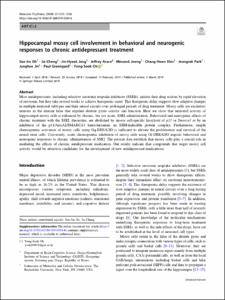Full metadata record
| DC Field | Value | Language |
|---|---|---|
| dc.contributor.author | Oh, Seo-Jin | - |
| dc.contributor.author | Cheng, Jia | - |
| dc.contributor.author | Jang, Jin-Hyeok | - |
| dc.contributor.author | Arace, Jeffrey | - |
| dc.contributor.author | Jeong, Minseok | - |
| dc.contributor.author | Shin, Chang-Hoon | - |
| dc.contributor.author | Park, Jeongrak | - |
| dc.contributor.author | Jin, Junghee | - |
| dc.contributor.author | Greengard, Paul | - |
| dc.contributor.author | Oh, Yong-Seok | - |
| dc.date.accessioned | 2019-06-21T05:53:06Z | - |
| dc.date.available | 2019-06-21T05:53:06Z | - |
| dc.date.created | 2019-03-28 | - |
| dc.date.issued | 2020-06 | - |
| dc.identifier.issn | 1359-4184 | - |
| dc.identifier.uri | http://hdl.handle.net/20.500.11750/9995 | - |
| dc.description.abstract | Most antidepressants, including selective serotonin reuptake inhibitors (SSRIs), initiate their drug actions by rapid elevation of serotonin, but they take several weeks to achieve therapeutic onset. This therapeutic delay suggests slow adaptive changes in multiple neuronal subtypes and their neural circuits over prolonged periods of drug treatment. Mossy cells are excitatory neurons in the dentate hilus that regulate dentate gyrus activity and function. Here we show that neuronal activity of hippocampal mossy cells is enhanced by chronic, but not acute, SSRI administration. Behavioral and neurogenic effects of chronic treatment with the SSRI, fluoxetine, are abolished by mossy cell-specific knockout of p11 or Smarca3 or by an inhibition of the p11/AnxA2/SMARCA3 heterohexamer, an SSRI-inducible protein complex. Furthermore, simple chemogenetic activation of mossy cells using Gq-DREADD is sufficient to elevate the proliferation and survival of the neural stem cells. Conversely, acute chemogenetic inhibition of mossy cells using Gi-DREADD impairs behavioral and neurogenic responses to chronic administration of SSRI. The present data establish that mossy cells play a crucial role in mediating the effects of chronic antidepressant medication. Our results indicate that compounds that target mossy cell activity would be attractive candidates for the development of new antidepressant medications. © 2019, Springer Nature Limited. | - |
| dc.language | English | - |
| dc.publisher | Nature Publishing Group | - |
| dc.title | Hippocampal mossy cell involvement in behavioral and neurogenic responses to chronic antidepressant treatment | - |
| dc.type | Article | - |
| dc.identifier.doi | 10.1038/s41380-019-0384-6 | - |
| dc.identifier.scopusid | 2-s2.0-85062636365 | - |
| dc.identifier.bibliographicCitation | Molecular Psychiatry, v.25, no.6, pp.1215 - 1228 | - |
| dc.description.isOpenAccess | TRUE | - |
| dc.subject.keywordPlus | GRANULE CELLS | - |
| dc.subject.keywordPlus | SYNAPTIC PLASTICITY | - |
| dc.subject.keywordPlus | DEPRESSION | - |
| dc.subject.keywordPlus | P11 | - |
| dc.subject.keywordPlus | STRESS | - |
| dc.subject.keywordPlus | EXPRESSION | - |
| dc.subject.keywordPlus | MOOD | - |
| dc.subject.keywordPlus | IDENTIFICATION | - |
| dc.subject.keywordPlus | NEUROBIOLOGY | - |
| dc.subject.keywordPlus | FLUOXETINE | - |
| dc.citation.endPage | 1228 | - |
| dc.citation.number | 6 | - |
| dc.citation.startPage | 1215 | - |
| dc.citation.title | Molecular Psychiatry | - |
| dc.citation.volume | 25 | - |
- Files in This Item:
-
 기타 데이터 / 0 B / Adobe PDF
download
기타 데이터 / 0 B / Adobe PDF
download



